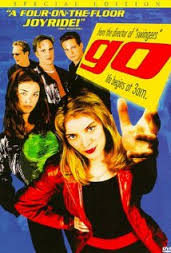
GO
US, 1999, 98 minutes, Colour.
Sarah Polley, Katie Holmes, Desmond Askew, Scott Wolf, Jay Mohr, Timothy Olyphant, William Fichtner.
Directed by Doug Liman.
Go is the second film from director Doug Lyman after Swingers. He then went on to unexpectedly make the successful espionage thriller, The Bourne Identity.
As with Swingers, the film focuses on young adults. This time there are three stories, the screenplay going back over the same time and then following different characters and their contrasting stories, then their interlinking. One focuses on Sarah Polley as a young would-be student who is tempted to make a drug deal. She tries to make it, suspects that she is being set up by the police, backs out and is then run over accidentally. Another story focuses on two soap opera actors, Scott Wolf and Jay Mohr. They also are after drugs and want to set up a deal. They are in debt and are in the power of an undercover policeman and his group so that they will expose dealers. There is some amusement in this story because the two actors are gay. The audience is led to believe that the policeman setting them up is also gay, being quite provocative in his behaviour, especially in the bathroom. However, it emerges that he is selling goods out of hours, moonlighting as a salesman and wants them to join. The third story consists of the drug dealer himself, played by Timothy Olyphant.
The film reflects the club culture, especially of the 90s, the amount of drug-taking in the United States and in the cities. It is well acted, well written - but is a disturbing presentation of life in the American cities. Other films treating of themes in a similar way were Swingers, the film about Club 54 in New York City, 54, and the Club Kids film, Party Monster.
1. Impact of the film? Young adults in Los Angeles? Partying, drugs, criminal activity? Work? Living in the present? On the go? Future?
2. The Los Angeles settings, homes, drug bases, supermarkets? The open road, between Los Angeles and Las Vegas? The world of Las Vegas, the hotels, the streets, the marriage chapels? The gaudy world?
3. The soundtrack, the wide range of contemporary songs, their use, background, indicating action and characters?
4. The structure of the film: Christmas Eve, the hours at the beginning of each story, the characters at the time, the screenplay veering to following three different stories? Interlinking them? Bringing them to a resolution?
5. The characters, audience empathy with them, or not? Their backgrounds, their ambitions, their work, their fears, money deals, drug deals? The police?
6. Ronnie and her story, working in the supermarket? Her friendship with Claire? Her going to give up her job, her need for money for rent? The fear of eviction? Her agreeing to work extra for Simon and his going to Las Vegas? Adam and Zac and their arrival, eyeing her, wanting to buy Ecstasy? Their friendship with Simon? Ronnie and her offer, going to Simon's source, Todd? Her plausible tale, the explanations for getting the money? Her arrival, understanding that it was a set-up, the drugs down the toilet, her flushing them away, her leaving? The policeman and his trying to lure her into being a dealer? Her going back, getting the aspirin, returning it to Todd, lying to him? Claire and Mannie and the party, the selling of the aspirin, the young people and their eagerness to do deals? Making the money? Todd finding the truth, coming to the rave party, chasing her, the car park, her being hit, run over, pushed over the side? The irony to discover that it was Adam and Zac who had hit her, their going back, trying to dispose of the body so that it would be found and taken to hospital? Her waking up in hospital, coming back to work? Her putting pressure on Claire to stay with Todd? Claire, her naivety, her fears, waiting for Ronnie to return? Mannie, the drugs, Ronnie remembering that he was in the cemetery, going to rescue him?
7. Simon, his place at the beginning of the story, his decision to go to Las Vegas? Getting Ronnie to take his place? At Las Vegas, his friends? With the gun, accidentally shooting Victor Junior in the arm? His tactic for running away? His being with Marcus, having Todd's credit card and leaving it behind? Marcus and his character, style, with Simon? Their coming back to Los Angeles? Victor Junior, the pressure from his father, the humiliation of being shot? The credit card and Todd's address? Victor and his father following Simon to Los Angeles, the encounter with Todd, discovering the truth, Simon's arrival? His being shot in the arm for revenge?
8. Adam and Zac, actors, their being in the supermarket, wanting to find Simon, the drugs? The irony of its being a police set-up? Their being wired? Their getting Ronnie to come and deliver the drugs, Bourke and his pressures on them? The set-up? The foiled plan? Bourke, his inviting Adam and Zac to the Christmas party, in the bathroom, naked, getting ready for the dinner? Giving the wrong message? His wife? The irony of the door-to-door sales and his wanting to recruit Adam and Zac? Their bickering, their going back and the rave party, knocking Ronnie down, their behaviour, going back for the body, making sure she could go to hospital? The irony that this was all on the wire? Their doing their duty to the police? Their future?
9. The development of characters overnight - or not? Their being trapped in their world? Making do? The future - and all this happening over again? The comment on contemporary society, the hedonism of young people, living in the present without regard to the future?